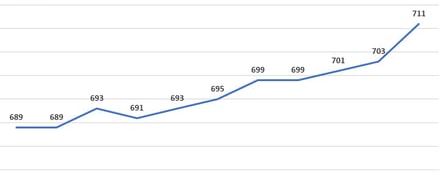A credit score is a three-digit number that reflects a person’s creditworthiness. A good credit score can open up many opportunities for a person, such as access to better credit terms and lower interest rates. While it can take time to build good credit, there are several factors that can cause credit scores to rise quickly. Here are some of the most common causes:
Payment history: Payment history is the most important factor in determining a person’s credit score, accounting for 35% of the total score. Paying bills on time and in full every month can quickly improve a person’s credit score. Conversely, late payments, missed payments, and defaults can cause credit scores to drop quickly.
Credit utilization: Credit utilization refers to the amount of credit a person is using compared to their total credit limit. Keeping credit utilization low, ideally below 30%, can help boost credit scores. For example, if a person has a credit card with a $10,000 limit and a balance of $3,000, their credit utilization ratio would be 30%.
Length of credit history: The length of a person’s credit history can also impact their credit score. Generally, having a longer credit history is better, as it shows that a person has a track record of using credit responsibly. However, this factor only accounts for 15% of the total score, so it may not have as big of an impact as other factors.
Mix of credit types: Having a mix of credit types, such as credit cards, loans, and mortgages, can also help boost credit scores. This factor accounts for 10% of the total score. However, it’s important to only take on credit that a person can afford to pay back, as taking on too much debt can harm credit scores.
Credit inquiries: When a person applies for credit, such as a loan or credit card, the lender will often check their credit report. This is known as a credit inquiry. Too many credit inquiries in a short period of time can cause credit scores to drop. However, a single inquiry is unlikely to have a significant impact on credit scores.
In summary, payment history and credit utilization are the two most important factors in determining a person’s credit score. Keeping payments on time and credit utilization low can quickly boost credit scores. Additionally, having a mix of credit types and a longer credit history can also help improve credit scores. By practicing responsible credit habits, a person can work towards achieving a high credit score and reaping the benefits that come with it.
